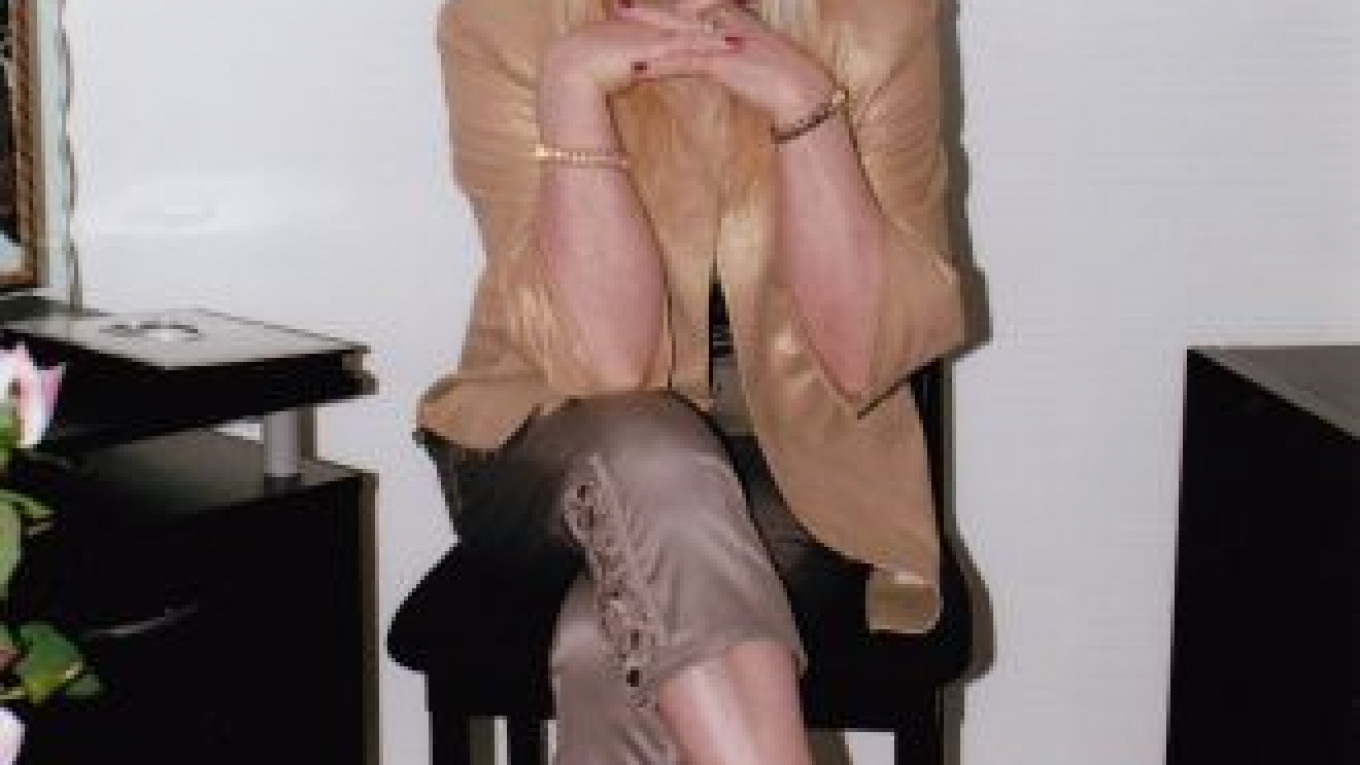VANCOUVER, British Columbia — Professionals and blue-collar workers, young and old, male and female — there is no standard profile of people looking for their soul mate. But those who are wary of the online approach are finding Russian emigres like Fatima Milano give a personal touch learned in the old country, and sometimes a little bit more.
Fifteen years after moving to Vancouver from Vladikavkaz, Milano has become an almost mythical presence in the city. She has more than 1,000 clients and knows how badly her services are needed.
“Lonely people have never been more occupied like they are in our computerized age,” Milano said. “It has never been this hard to focus on one’s personal life. By using the professional services of a matchmaker, you save your time and this allows you to concentrate on your career and family.”
Milano is among a handful of Russian-speaking women who have made a business out of helping Russians and Westerners find love. The matchmakers, or svakhi as they call themselves within the emigre communities, don’t have a common business strategy but are equally enthusiastic when it comes to playing cupid for others — and themselves.
The ability to make good matches comes naturally to Milano. She helped set up three of her friends when she lived in Russia. Eventually she found a husband for herself and moved to Vancouver.
Milano first dabbled in fortune-telling, which she learned from her mother, to earn money after arriving in Canada. Most of the women that came to her were divorced, which inspired Milano to become a professional matchmaker. It was a hobby for the first year while she built a client base. Milano started off by meeting lonely hearts in her home. Now, 13 years later, she has an office and stacks of binders that are packed with photographs of more than 1,000 clients.
It can take years to find a mate so turning to a matchmaker for help saves a lot of time, Milano said. And some customers have no time to lose. One of Milano’s oldest clients is 72. Another client, a busy doctor, threw out his cell phone in the hope of getting more free time.
“These people don’t have the time for [online dating],” Milano said. “They are [busy] earning money.”
Milano has posted ads for her Happiness Introduction dating service in local ethnic newspapers. But she estimates that the majority of her clients come through referrals. Most of the female clients are Russian, but the men have diverse nationalities. In addition to Russians and Canadians, Milano has worked with Japanese, Iranian, Indian and Polish men.
She meets her clients in person, gets them to fill out questionnaires and then shows them pictures of potential candidates. The clients can pick their prospective matches by asking for more information on the individuals in the pictures that appeal to them. They can also turn to the expert herself for advice on who she thinks would make the best partner.
As Milano flips through her many binders, she can easily recall all her clients’ names, habits and preferences. The matchmaker said she can intuitively match the right people together — something she has been able to do with an 80 percent success rate.
To leave no doubt about the strength of her intuition, she can tell clients their fortune.
After the client selects someone to meet, Milano contacts the other party and checks whether they agree to a date. She then passes the woman’s contact information to the potential date and remains on call as an adviser during the startup phase of the romance.
Milano said she has seen other Russian women try and fail to copy her work.
“Being a matchmaker is a calling. It is impossible to learn this art,” she said. “It is intuition, in my blood.”
Clients pay a yearly membership fee to use Milano’s services. It’s a full-time job, and she even uses her birthday parties as an event to facilitate couples’ introductions.
On the other side of Canada, Svetlana Lapina is only working part time at Heart Hunters, the Toronto-based matchmaking service she started three years ago.
Lapina was motivated to get into matchmaking by self-interest. A female friend who had recently moved from Russia was living with her in her small apartment. In order to be relieved of her house guest more quickly, Lapina leveraged her contacts to find dates for the immigrant. A worthy suitor eventually materialized, and Lapina got her space back.
At the travel agency where Lapina works, customers regularly complained that they had no one to go on trips with, so she began to jokingly suggest that she would find them travel mates.
“Then I thought, why not open this business? Why not earn money for it?” she said.
She posted an ad in a local newspaper, and people started flocking to her for help. Even grandmothers and mothers have called her with requests to help find a partner for their children.
Heart Hunters now has about 100 clients that Lapina works with in the evenings and weekends. Clients pay a $50 deposit and another $200 for a chance to meet three candidates. This service already paid off for Lapina’s oldest customer — an 82-year-old male who she matched with a spirited 76-year-old lady.
Another matchmaker from the Toronto area, Yelena Pavlenko, is still trying to get her business off the ground. The Chance Matchmaking Agency is her third venture in the dating field. She tried to start a matchmaking service in the early 1990s while she lived in Ukraine and worked as a librarian. She started it again in 2003, several years after moving to Toronto, but a family issue forced her to abandon the business.
The phone calls didn’t stop after Pavlenko stepped away from matchmaking, so she was inspired to give it another try.
She launched the Chance Matchmaking Agency as a website where men pay to get the contact information of their female matches. The site, which has attracted 30 clients since going live in September, also has a blog where Pavlenko offers dating advice.
Pavlenko is still manually matchmaking behind the web interface, and her clients have the option of meeting her in person. She said some of her clients have had bad experiences with online dating, including being set up with women who received a commission based on the number of men that the dating agency sold their contact information to.
Other matchmakers have also come across online scams. Fatima Milano said one of her female clients exchanged messages on a dating site with a man and then got an offer to meet him in a park at a suspiciously early hour. Milano talked the woman out of the date and makes sure to check all her clients’ documents before she agrees to work with them. She also refuses to work with married people.
“Not everyone who calls me becomes my client,” she said. “This is unlike the Internet, where anyone can put up their information and photos on any dating site.”
A matchmaker also trumps online dating for those looking for a serious relationship, Milano said. She explained that men tend to look for intimate relations on the Internet, while women want to find long-term partners. This disconnect can lead to disappointments — which is why a matchmaker is useful.
Matchmakers typically develop friendships with their clients. Milano takes a maternal view of her customers and has served as a witness in their marriage ceremonies. Svetlana Lapina said she is also on close terms with some of her clients.
Lithuanian emigre Natalija Scheunemann said she empathized with her Russian-speaking clients because she has been in the same situation herself.
Scheunemann moved to Chicago from Klaipeda in 2000. She saw the families of Russian-speaking immigrants break apart and the newly single people struggle to find other mates. She made it her mission to help immigrants find each other and start new relationships.
“I was like a bus stop. People could come by and walk away with someone,” Scheunemann said.
But she gave up her matchmaking efforts a year ago. There were too few men and too many immigrants with crippled lives, Scheunemann said.
The svakhi sometimes source partners in their old country. Although Svetlana Lapina hasn’t managed to match any of her Western clients with women who still live in Russia, she is not giving up. Westerners are afraid that Russian women only want their money or passports, Lapina said, adding that one of her goals is to help foreign men overcome this problem.
Lapina said she wants to combine her work as a travel agent and matchmaker by organizing dating tours to Russia. The men would get a tour of the sights in St. Petersburg and Moscow, and then have some time to meet the girls they exchanged letters with through Lapina’s matchmaking service.
Some matchmakers enter the profession while trying to address their own need for a mate. Mirra Person began her search for a foreign husband while still in Ukraine, after she lost her job. She first turned to local dating agencies, but they tricked her with multiple scams.
Person eventually had to sell her apartment to support her family. She used some of the proceeds to buy a computer. Since she had no English skills, her 14-year-old son installed translation software for her, and she began to peruse foreign lonely heart sites.
Her single and divorced friends learned of her efforts and asked for help finding mates.
“Most of my friends didn’t have a computer and didn’t know the language, but I had the instruments to help,” Person said. “So, I helped as much as I could.”
The women, mostly over 40, came to Person, and she advised them about their photos, helped them find good dating sites and translated their letters. Even though the letters were full of mistakes, soon the women started to receive bouquets of flowers, get married and move abroad — while Person continued to wait.
Then she met her future husband on a website where they had both been registered for three years. He was so smitten the second time he saw her that he proposed at Vinnytsya Airport and only remembered that he still needed to pick up his luggage when they were riding away in a taxi.
Person hasn’t returned to matchmaking since getting married and moving to the United States with her two children. That chapter in her life is now closed, she said.
“I have outgrown it. At that time, I was doing it from the heart, not for money but because I simply loved doing it,” Person said. “I liked seeing two people meet, look at each other, smile and shine brightly.”
A Message from The Moscow Times:
Dear readers,
We are facing unprecedented challenges. Russia's Prosecutor General's Office has designated The Moscow Times as an "undesirable" organization, criminalizing our work and putting our staff at risk of prosecution. This follows our earlier unjust labeling as a "foreign agent."
These actions are direct attempts to silence independent journalism in Russia. The authorities claim our work "discredits the decisions of the Russian leadership." We see things differently: we strive to provide accurate, unbiased reporting on Russia.
We, the journalists of The Moscow Times, refuse to be silenced. But to continue our work, we need your help.
Your support, no matter how small, makes a world of difference. If you can, please support us monthly starting from just $2. It's quick to set up, and every contribution makes a significant impact.
By supporting The Moscow Times, you're defending open, independent journalism in the face of repression. Thank you for standing with us.
Remind me later.






